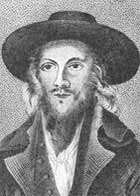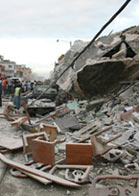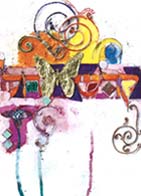God & Theology
 Tablets
TabletsWednesday, February 3, 2010 | Jewish Ideas Daily » Daily Features
A few days ago, Apple released yet another new device aimed at integrating words written, spoken, and seen, and freeing them from the limitations of time and space. It joins an array of other products making texts and audio-video materials available as never before. Is anything being lost here? The Talmud declares: "Written words should not be spoken, and spoken words should not be written." What the rabbis specifically sought to impress on Jewish minds was the difference between the Written Torah, fixed, immutable, divine, and the constantly accreting commentaries known as the Oral Torah, spontaneous, dynamic, human yet also somehow partaking of...
 Tu b’Shevat: What Sorts of Trees are We?
Tu b’Shevat: What Sorts of Trees are We?Friday, January 29, 2010 | Jewish Ideas Daily » Daily Features
Deuteronomy 20, discussing the laws of war, and in particular siege, forbids the cutting down of fruit trees, adding, in an ambiguous and tantalizing phrase, "ki ha-adam etz ha-sadeh." The words can be translated as a simple if enigmatic statement ("for man is a tree of the field") or as a question (in the rendering of the JPS Torah,"are trees of the field human?"). The classical commentators were likewise divided. The Talmud, reading the phrase as a statement, is moved to offer a prototype of a human "tree of the field": a virtuous sage, a worthy teacher and role model. Rashi, the...
 Let My People In
Let My People InThursday, January 14, 2010 | Jewish Ideas Daily » Daily Features
Debates over conversion to Judaism show no sign of abating, least of all in Israel. Last week, the legal adviser to the country's chief rabbinate declared that all conversions may retroactively be annulled at any time. In the ensuing firestorm of criticism, even some on the religious Right chimed in, especially those reflecting a historically more lenient Sephardi approach. A great deal of institutional politics is involved here, including between the ultra-Orthodox in Israel and the Modern Orthodox in the United States; some of this came to light in the recent disgrace and resignation of an ultra-Orthodox foe of the moderates....
 The Harshness of Creation
The Harshness of CreationLike the 2004 tsunami that devastated southeast Asia, yesterday's catastrophic earthquake in Haiti, a poverty-stricken country with a legacy of home-grown violence and suffering, inevitably provoked the terrible question: where was God? One answer derives from Jewish religious sources, and specifically from the teachings of the Kabbalah. It has to do with tzimtzum, or contraction: that is, God's own contraction and limitation of Himself in order to make space for the finite—and invariably flawed—worlds of physical nature and human action. The idea was most famously developed in Safed, Palestine by the 16th-century kabbalist Isaac Luria as part of a complicated, esoteric myth...
 Art is a Camera
Art is a CameraFriday, January 8, 2010 | Jewish Ideas Daily » Daily Features
Ever since the Second Commandment, with its prohibition of "images," Judaism has been an un-, or even anti-visual culture. Or so we are told. While there is some truth to this notion, it is a very limited truth. The realities—historical, philosophical, above all aesthetic—are much more complicated and much more interesting. After all, the Bible itself tells us that at Sinai the people "saw the voices." Scholars have demonstrated the rich visual culture at work in Jewish history, as well as the role of the visual imagination in theology and mysticism—and in the daily experience of those for whom Judaism is...
Editors' Picks
Face to Faith Larry Yudelson, Jewish Standard. The story of how the Dalai Lama encountered the Jewish community in 1990 is well known. Less well-known is how Jews first encountered the Dalai Lama—in an 1804 compilation of travelers' accounts.
Deeds of the Fathers David Hartman, Jerusalem Post. Who better exemplifies the contract between God and the Jews: the Abraham willing to sacrifice his son Isaac, or the Abraham empowered by God to argue with Him?
How Bad Faith Drives Out Good Melanie Phillips, Standpoint. Religion, or more precisely the religion of the Bible, and more precisely still the Judaism at its core, is the crucible of reason. Those who reject the religion of the Bible are rejecting reason itself.
Judaism as Protest Movement Tomer Persico, 7 Minim. From Abraham to Korah's ill-fated faction to the beseeching prophets and doubting sages, Jewish tradition has always fostered protesters and protests—not least against God Himself.
Face to Face Gavi Brown, Kol Hamevaser. One was a talmudist, the other an ontologist—yet the two figures' work reveals striking similarities. Either it was a case of plagiarism or an instance of cosmic significance.
Messiah 2012 Moment. Twenty-two Jewish figures speak about Obama, utopia, apocalyptic Judaism, psychological rescue, and the concept of mashiah today—and one names the man whom he believes to be Judaism's messiah-in-waiting.
Torah and Telos Jerome Gellman, Notre Dame Philosophical Reviews. A rational argument for taking one's religious text as divine revelation might have succeeded, were it not for the failure of the author's test-case: his justification for believing in a revealed Torah. (Interview with the book's author here.)
Darwin and the Rabbis Michael Kay, Thinking through My Fingers. We're told that "religion" and "science" went head to head over evolution. But nineteenth-century rabbis, including Samson Raphael Hirsch, Hermann Adler, and Abraham Isaac Kook, were all willing to engage with Darwinism.
Jewish Literacy and Jewish Imagination Samuel Lebens, Haaretz. If they wish to make an impact, progressive Jewish activists and thinkers must learn to speak the language of Judaism.
Must a Jew Believe Anything? Menachem Kellner, Book of Doctrines and Opinions. According to one Maimonides scholar, dogma is a device for determining who is "out," whereas the demand of the hour is finding ways of keeping Jews "in." (Interview by Alan Brill.)

